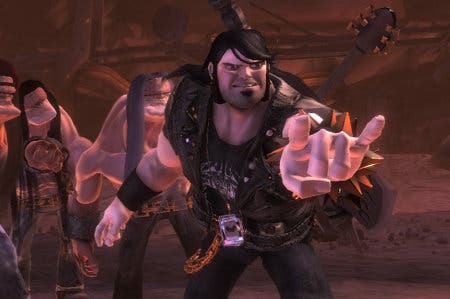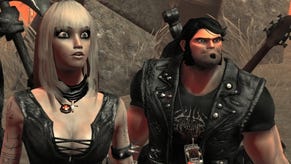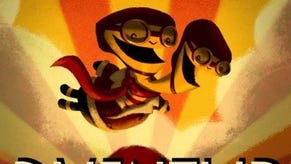Tim Schafer on free-to-play, showing works in progress and Brutal Legend's misleading marketing
On Vivendi: "We'll never say RTS, ever. Even if someone asks us if it's an RTS we'll say no."
Legendary game designer Tim Schafer's studio Double Fine has seen a noticeable shift in the sort of games it produces. After spending roughly six years on the psychedelic epic Psychonauts and another four on the metal-themed genre-blender Brutal Legend, the studio shifted its focus to smaller projects, releasing five games in the last couple of years with four more on the immediate horizon (The Cave, Double Fine Adventure, Kinect Party, and Middle Manager of Justice).
From the spooky saccharine Costume Quest, to tower-defense mech shooter Iron Brigade, to Kinect curiosities like Once Upon a Monster and Happy Action Theater, Double Fine's current repertoire is certainly diverse, but one can't help wonder if it will return to larger scale game development.
We caught up with Sir Timothy Schafer at PAX Prime to gather his thoughts on free-to-play business models, self-publishing, and what went wrong with Brutal Legend.
First off, Schafer explains the studio's first move to mobile with its debut iOS title, Middle Manager of Justice.
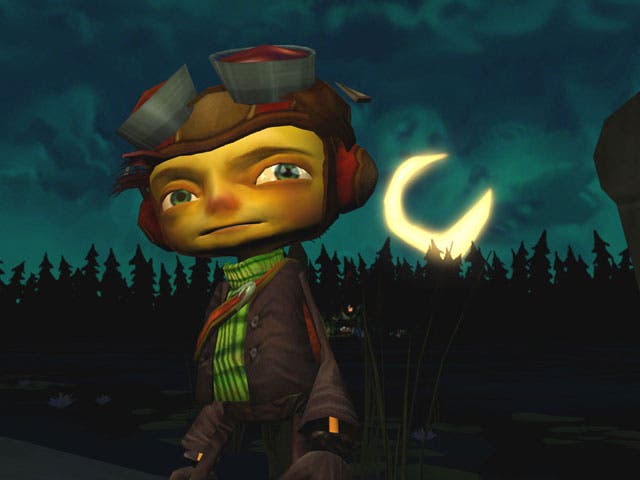
"There's a lot that's exciting about mobile," says Schafer, noting the popularity of the platform as one reason, but mostly he's excited about the rise of free-to-play models.
"There's so many other ways to fund games and get games made than the traditional publishing model that I've done for years. So I don't think that we'd ever do a $60 standard publishing deal."
Tim Schafer, founder, Double Fine
"I'm really interested in some of these free-to-play models that are coming out, even if some of them are done scarily and slime-ily," he says. "I think there's a lot of potential in allowing us to release a game that we can stay with and keep making improvements for because it's funded by the free-to-play stuff in the game."
This more dynamic back-and-forth with the community is a huge shift from the way things were done only a few years ago. "We're used to just polishing a game then crossing our fingers and shipping it and going 'I hope I got it right! I hope I got it right!'" With free-to-play, "we can make it as good as we can, then see what the fan reactions is to it and see what people are responding to most and improve on that."
Looking back at his profile, Schafer laments not being able to continually alter his past creations in reaction to the community.
"With a lot of our games I really wish we could have had an ongoing relationship with the fans like [with] Brutal Legend. Making more content, or playing the multiplayer game and hearing what people liked or didn't like... I've never been able to do that, so a free-to-play game is a great opportunity."
Specifically, there was a lot in Brutal Legend that Schafer would have liked to have added. "There's so many modes to multiplayer in Brutal Legend that we had to leave out because we didn't have time. There were a lot of different options that we wanted to add. We had a whole faction for Lionwhyte that we wanted you to be able to play."
This isn't the only game Schafer would have liked to tinker with more post-release. "I would have liked to have gone deeper with the combat system in Costume Quest. We didn't have time.. if we somehow had a way to keep a team on that game we could have added deeper combat to it."
When I ask Schafer if he's interested in returning to larger scale games like Psychonauts or Brutal Legend he says, "Yeah, but not at $60 retail."
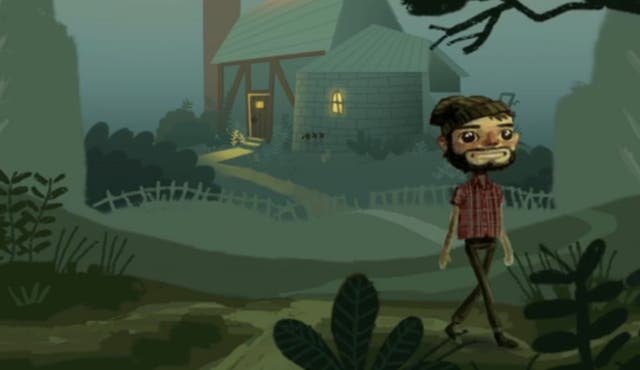
"You think people are going to reject you or your ideas about the game because they'll see something they don't like, but what actually happens is they embrace them more because they feel more included and more like a part of it."
Tim Schafer, founder, Double Fine
"That thing I was talking about with the advantages of free-to-play mobile games - that can be applied to a larger game. It can grow over time organically. There's not this huge $45 million risk."
He notes Minecraft as a perfect example of a game being sold in its primitive form that built up an enormous audience before it was even released. "He [Markus "Notch" Persson] started selling it when he'd only worked on it for three weeks. He started small and was able to fund it himself and that was really inspiring. There's so many other ways to fund games and get games made than the traditional publishing model that I've done for years. So I don't think that we'd ever do a $60 standard publishing deal."
Instead, Schafer is mostly interested in self-publishing, though Double Fine has angel investor Dracogen backing Middle Manager of Justice and the PC ports of various titles in its back catalogue.
One of the prime advantages of self-publishing Schafer explains is that it allows you to "control your own messaging."
"I've had this epiphany about how it doesn't hurt to be open," says Schafer. "Let people see how it progresses over time, so they feel the way we feel about the game. So they're really attached to them."
"You think people are going to reject you or your ideas about the game because they'll see something they don't like, but what actually happens is they embrace them more because they feel more included and more like a part of it."
"Vivendi [on Brutal Legend] was like 'No. Absolutely not. We'll never say RTS, ever. Even if someone asks us if it's an RTS we'll say no.'"
Tim Schafer, founder, Double Fine
"We used to have this terror that if I go off-message and say the wrong no one will buy my game, which is not true."
That being said, he still curates the announcements to some extent, but doesn't have to "have a press release that somebody approved."
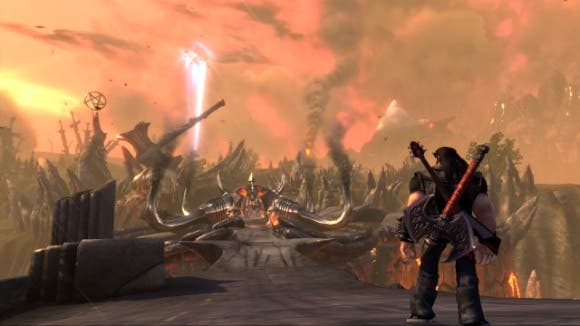
Looking back at it, Schafer feels that this lack of communication with the audience was the single biggest thing that doomed the poor-selling, albeit critically acclaimed Brutal Legend, a hybrid RTS/action game that was marketed as an action-adventure.
"There was definitely a messaging problem with that game," explains Schafer. "That's one example of how the openness would have helped that game a lot. Say we were developing that and sharing our battle system with people before we launched; not only would people have known about it, but people would contribute ideas to it and embrace it, and feel like it was their idea instead of this nasty shock."
"I think it's the neatest thing about the game turning into a big negative for people, whereas if we'd brought them in the process early they would have enjoyed those parts about the game a lot more."
Tim Schafer, founder, Double Fine
Schafer admits that he's not entirely blame free and that Vivendi, EA and Double Fine all took part in its notorious bait-and-switch.
"Vivendi was like 'No. Absolutely not. We'll never say RTS, ever. Even if someone asks us if it's an RTS we'll say no.'"
"EA mostly just didn't emphasise it," Schafer says. "They never told us not to talk about it. In fact, they did a whole press event at a bar in San Francisco that was all about the multiplayer. We released our multiplayer tutorial trailer before the game came out, so they weren't hiding it at all."
As far as Double Fine goes, it released a hugely misleading demo that focused on the game's driving and melee combat. This was entirely due to accessibility reasons regarding the game's steep learning curve. "The demo was kind of an accident," explains Schafer. "The mechanics ramp up slowly over time, so the demo is usually the first mission, so you just don't know those complicated RTS mechanics yet."
"The reason I went along with it is because it became something different. It started as an RTS, but it evolved over time and it really became different from an RTS game. Like I said after release, if you play it like an RTS game you won't win. You have to play it like this new RTS/action hybrid. So because it became something different I felt it was not correct to call it an RTS anymore."
Ultimately, Schafer regrets how the game was portrayed prior to release and thinks it could have been a much greater success.
"The part that I felt was most special about the game got unfairly vilified because of poor messaging," Schafer laments. "I think it's the neatest thing about the game turning into a big negative for people, whereas if we'd brought them in the process early they would have enjoyed those parts about the game a lot more."
"But I stand by it," he says, proudly. "I think it's still a lot of fun. People would play it online and they'd really enjoy it."
